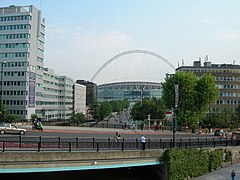Wembley Park
| Wembley Park | |
|---|---|
 View from the station, looking south towards Olympic Way and Wembley Stadium, 2007 |
|
| Wembley Park shown within Greater London | |
| London borough | |
| Ceremonial county | Greater London |
| Region | |
| Country | England |
| Sovereign state | United Kingdom |
| Post town | WEMBLEY |
| Postcode district | HA9 |
| Dialling code | 020 |
| Police | Metropolitan |
| Fire | London |
| Ambulance | London |
| EU Parliament | London |
| UK Parliament | |
| London Assembly | |
Wembley Park is a district of the London Borough of Brent, England. It is roughly centred on Bridge Road, northeast of Wembley proper. It is 7.6 miles (12 km) northwest from Charing Cross.
The name Wembley Park refers to the area that, at its broadest, falls within the limits of a late 18th century landscaped estate in northern Wembley. More recently, it is used to describe the part of the estate which has served as a pleasure and events destination since the 1890s. It was a key area of the Metro-land development in the 1920s.
Wembley Park is home to the Wembley 'complex': Wembley Stadium, England's primary football stadium and a major sports and entertainment venue; as well as SSE Arena, a concert venue. The former British Empire Exhibition was held on the site, when the district was part of the historic Middlesex county. Today the district boasts a large number of pubs along with new retail and housing developments near the stadium complex. The Chalkhill housing estate is also located here. The east is home to large industrial land, called Stadium Industrial Estate, adjacent to Brent Park. The north is mostly suburban upmarket residential areas with the Barn Hill point and Fryent Country Park behind it.
Wembley was in the parish of Harrow, and the manor of Wembley was a sub-manor of Harrow. It belonged to the Priory of Kilburn. After the Dissolution of the Monasteries, the Priory's lands in Wembley and Tokyngton came into the possession of Richard Page.
The Page family, successful local farmers, had already been leasing the land before the Dissolution of the Monasteries. The Pages became one of the largest and richest families in Middlesex.
...
Wikipedia

